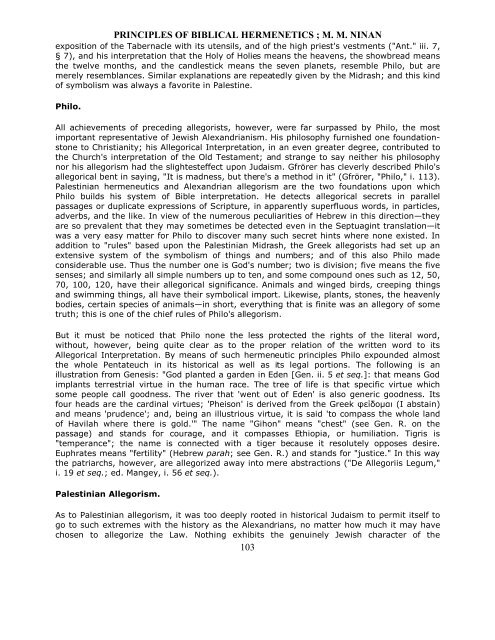Biblical Hermeneutics
You also want an ePaper? Increase the reach of your titles
YUMPU automatically turns print PDFs into web optimized ePapers that Google loves.
PRINCIPLES OF BIBLICAL HERMENETICS ; M. M. NINAN<br />
exposition of the Tabernacle with its utensils, and of the high priest's vestments ("Ant." iii. 7,<br />
§ 7), and his interpretation that the Holy of Holies means the heavens, the showbread means<br />
the twelve months, and the candlestick means the seven planets, resemble Philo, but are<br />
merely resemblances. Similar explanations are repeatedly given by the Midrash; and this kind<br />
of symbolism was always a favorite in Palestine.<br />
Philo.<br />
All achievements of preceding allegorists, however, were far surpassed by Philo, the most<br />
important representative of Jewish Alexandrianism. His philosophy furnished one foundationstone<br />
to Christianity; his Allegorical Interpretation, in an even greater degree, contributed to<br />
the Church's interpretation of the Old Testament; and strange to say neither his philosophy<br />
nor his allegorism had the slightesteffect upon Judaism. Gfrörer has cleverly described Philo's<br />
allegorical bent in saying, "It is madness, but there's a method in it" (Gfrörer, "Philo," i. 113).<br />
Palestinian hermeneutics and Alexandrian allegorism are the two foundations upon which<br />
Philo builds his system of Bible interpretation. He detects allegorical secrets in parallel<br />
passages or duplicate expressions of Scripture, in apparently superfluous words, in particles,<br />
adverbs, and the like. In view of the numerous peculiarities of Hebrew in this direction—they<br />
are so prevalent that they may sometimes be detected even in the Septuagint translation—it<br />
was a very easy matter for Philo to discover many such secret hints where none existed. In<br />
addition to "rules" based upon the Palestinian Midrash, the Greek allegorists had set up an<br />
extensive system of the symbolism of things and numbers; and of this also Philo made<br />
considerable use. Thus the number one is God's number; two is division; five means the five<br />
senses; and similarly all simple numbers up to ten, and some compound ones such as 12, 50,<br />
70, 100, 120, have their allegorical significance. Animals and winged birds, creeping things<br />
and swimming things, all have their symbolical import. Likewise, plants, stones, the heavenly<br />
bodies, certain species of animals—in short, everything that is finite was an allegory of some<br />
truth; this is one of the chief rules of Philo's allegorism.<br />
But it must be noticed that Philo none the less protected the rights of the literal word,<br />
without, however, being quite clear as to the proper relation of the written word to its<br />
Allegorical Interpretation. By means of such hermeneutic principles Philo expounded almost<br />
the whole Pentateuch in its historical as well as its legal portions. The following is an<br />
illustration from Genesis: "God planted a garden in Eden [Gen. ii. 5 et seq.]: that means God<br />
implants terrestrial virtue in the human race. The tree of life is that specific virtue which<br />
some people call goodness. The river that 'went out of Eden' is also generic goodness. Its<br />
four heads are the cardinal virtues; 'Pheison' is derived from the Greek φείδοµαι (I abstain)<br />
and means 'prudence'; and, being an illustrious virtue, it is said 'to compass the whole land<br />
of Havilah where there is gold.'" The name "Gihon" means "chest" (see Gen. R. on the<br />
passage) and stands for courage, and it compasses Ethiopia, or humiliation. Tigris is<br />
"temperance"; the name is connected with a tiger because it resolutely opposes desire.<br />
Euphrates means "fertility" (Hebrew parah; see Gen. R.) and stands for "justice." In this way<br />
the patriarchs, however, are allegorized away into mere abstractions ("De Allegoriis Legum,"<br />
i. 19 et seq.; ed. Mangey, i. 56 et seq.).<br />
Palestinian Allegorism.<br />
As to Palestinian allegorism, it was too deeply rooted in historical Judaism to permit itself to<br />
go to such extremes with the history as the Alexandrians, no matter how much it may have<br />
chosen to allegorize the Law. Nothing exhibits the genuinely Jewish character of the<br />
103


















